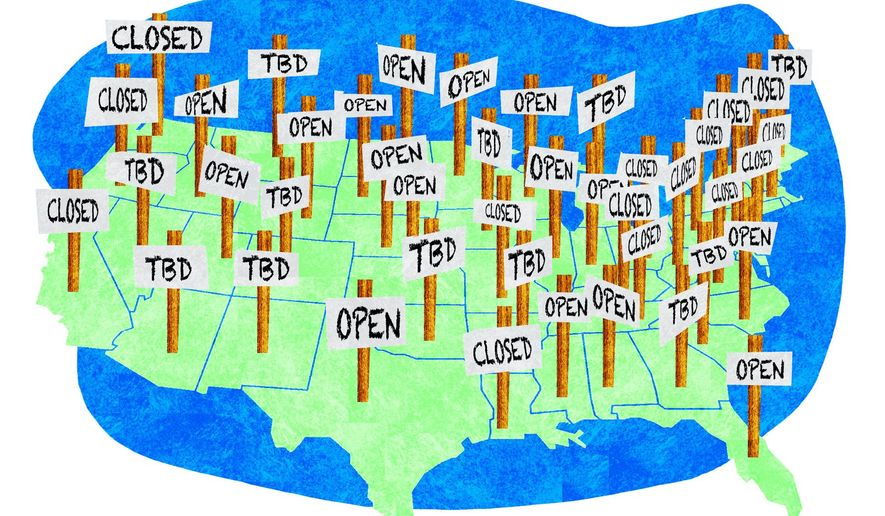OPINION:
As with other great crises, progressives are celebrating and conservatives are dreading that coronavirus will permanently expand government spending and leverage over the national economy. However, those invested in federal supremacy and global governance — liberal politicians, lawyers, academics, NGOs and journalists that promote bureaucratic overreach and the mischief of multilateral institutions — are in for some shocking surprises.
Diseases spread as far as commerce and armies reach. The Black Death originated in Asia and spread to Europe via trade routes but coming before Columbus it did not reach the Americas. When the Europeans finally arrived, their diseases and the lack of immunities among Native Americans did more to assure conquest than muskets.
The Spanish flu spread in the context of World War I, whose participants included Japan containing the German military in the Pacific. COVID-19 spread thanks to trade and travel with China, and the resulting devastation calls into question whether the Middle Kingdom is just too risky to be part of the Western international commercial system.
The economic slowdown will easily cost the U.S. economy $3 trillion and at the $10 million the federal government places on the value of human life when crafting environmental and safety regulations, another $1 trillion if 100,000 Americans are killed by the virus.
Given limitations of economic models for evaluating catastrophes and the underestimates of deaths caused by the virus, the overall loss will likely be much greater. And the permanent damage depressed stock prices impose on risk taking begs the question: Are cheap coffee makers and iPhones worth the apparent risks of more pandemics.
Democrats in Congress, former Vice President Joe Biden and politicians in Europe share President Trump’s disaffection with China, and one way or another trade will be managed and limited with the Middle Kingdom — far beyond diversifying sources of components to harden supply chains and ensure critical ingredients for drugs. Either the WHO, WTO and other multilateral institutions are reformed to limit Beijing’s corrosive and destabilizing influences or they will be marginalized.
The U.S. Constitution reserves primacy over public health, police powers, education and the like to the states — not to the president or big-city mayors. In a continental nation, pandemics reach metro areas in a sequence of waves — the virus may have peaked in metropolitan New York but not likely in many other states.
The terrible costs and taxes on personal liberty associated with social distancing, testing, tracking and quarantining are best weighed and most effectively minimized when implemented by the governors. Given that metro areas and regional economies overlap states the coalitions established by those leaders in the Northeast and West Coast make a lot of sense.
The governors can’t legally shutdown or limit travel and commerce with foreign nations or other states — the Constitution assigns those powers to Washington. Instead of insisting on powers he doesn’t have, Mr. Trump would be smart politically to offer to assist with travel and border controls where the governors indicate those are needed.
The $2 trillion relief package contains many new federal interventions into the economy — for example, extended unemployment benefits and sick leave, protections for collective bargaining agreements and union organizers for large companies taking aid and limits on executive salaries and payments to shareholders.
Virtually all have limited life spans that Democrats are hoping to make permanent but if they try, they will be frustrated.
The challenges the federal government is encountering getting out extended unemployment benefits, the incentives those create for businesses to lay off workers and the disincentives excessive benefits impose on workers to find new jobs illustrates why historically unemployment insurance has been run by the states — with some fiscal backstop from Washington in a crisis. Those benefits are best tailored to regional labor markets and to be effective, power must stay there.
Unions won’t have much luck organizing anyone with double digit unemployment and their ranks in the private sector will only dwindle further if they don’t voluntarily adjust contracts for the airlines and auto sectors. It’s no accident that Ford with a union faces a liquidity crisis by October if plant closures continue and its bonds were recently downgraded to junk but Toyota remains investment grade.
In the end, Congress likes to talk about limiting executive compensation and wealth, but Democrats and Republicans alike rely on rich folks to finance their campaigns.
Ultimately, incumbent politicians defer to powerful interests in their base or perish.
• Peter Morici is an economist and business professor at the University of Maryland, and a national columnist.




Please read our comment policy before commenting.